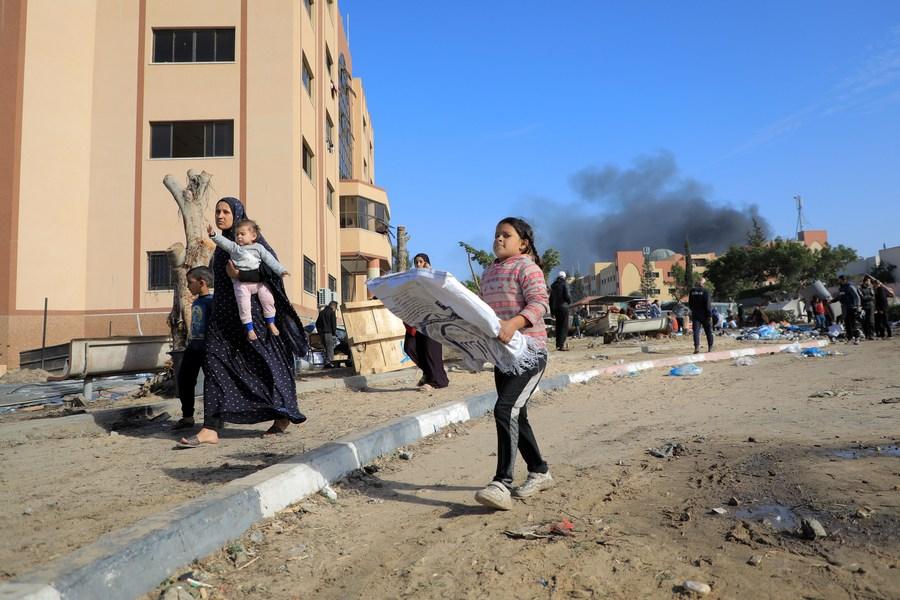

People leave their home after Israeli bombings in the southern Gaza
Strip city of Khan Younis, on Jan. 22, 2024. [Photo/Xinhua]
UN Secretary-General Antonio Guterres on Tuesday yet again called for an immediate humanitarian ceasefire in Gaza.
"I renew my appeal for an immediate humanitarian ceasefire. This will ensure sufficient aid gets to where it is needed, facilitate the release of hostages, and help lower tensions around the Middle East," he told a high-level open debate of the Security Council on the Middle East, including the Palestinian question.
No effective humanitarian aid operation can function under the conditions that have been forced on Palestinians in Gaza and on the humanitarian workers, he said.
Humanitarian delivery is not an exercise of counting trucks. It is about ensuring the right volume and quality of assistance reaches people in need. To be able to do its work, the United Nations needs to see a set of operational requirements met, said Guterres.
"We need safety. We are operating in a war zone. The current humanitarian notification mechanisms do not offer any real confidence for operations and planning humanitarian responses. A number of serious incidents have shown how these essential mechanisms need to be substantially improved. Safety also entails reliable and cleared roads inside Gaza, and unimpeded crossings at checkpoints.
"We need to be equipped to do our job. This includes telecommunications equipment, so convoys can communicate with each other; armored vehicles and protective gear, given the ongoing hostilities and the widespread contamination with explosive remnants of war; far greater logistical capacity; spare parts for infrastructure such as desalination plants, and other critical humanitarian items," he said.
There is also a need for more crossing points into Gaza to reduce congestion and avoid chokepoints. Humanitarian access to northern Gaza is lacking. In the first two weeks of January, out of 29 planned humanitarian missions to deliver life-saving supplies north of Wadi Gaza, only seven were accomplished, fully or partially. The majority of missions were denied access by Israel. After over 100 days of operations in the north, insecurity and fighting has continued, he said.
"I call for rapid, safe, unhindered, expanded and sustained humanitarian access throughout Gaza. I repeat my call for an end to all violations of international humanitarian law," said Guterres. "I renew my appeal for an immediate humanitarian cease-fire."
The humanitarian situation in Gaza is appalling, he said.
With winter bearing down, 2.2 million Palestinians in Gaza face inhumane, squalid conditions, struggling to simply make it through another day without proper shelter, heating, sanitary facilities, food, and drinking water. Everyone in Gaza is hungry. A quarter of Gaza's population -- more than half a million people -- are grappling with catastrophic levels of food insecurity, he said.
Meanwhile, nearly 1.5 million people are now crammed inside Rafah governorate. Disease is spreading as the health system collapses. Only 16 of Gaza's 36 hospitals are even partly functional. That means the people of Gaza not only risk being killed or injured by relentless bombardments, they also run a growing chance of contracting infectious diseases, he said.
